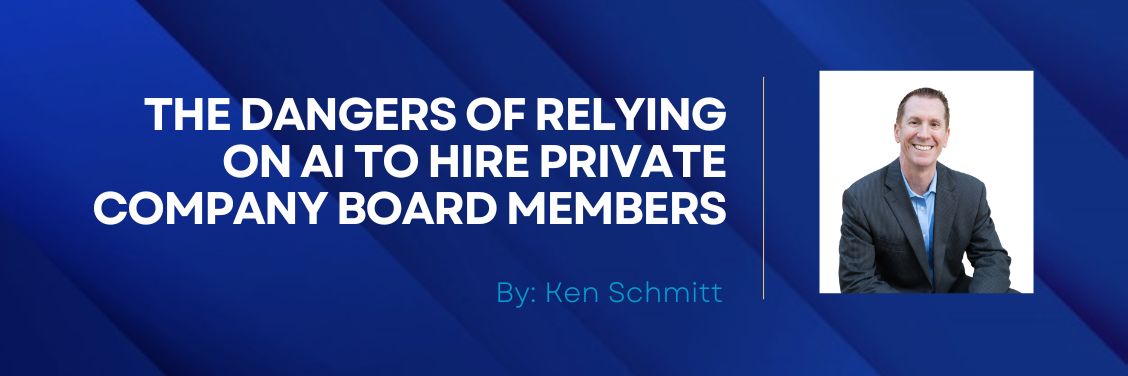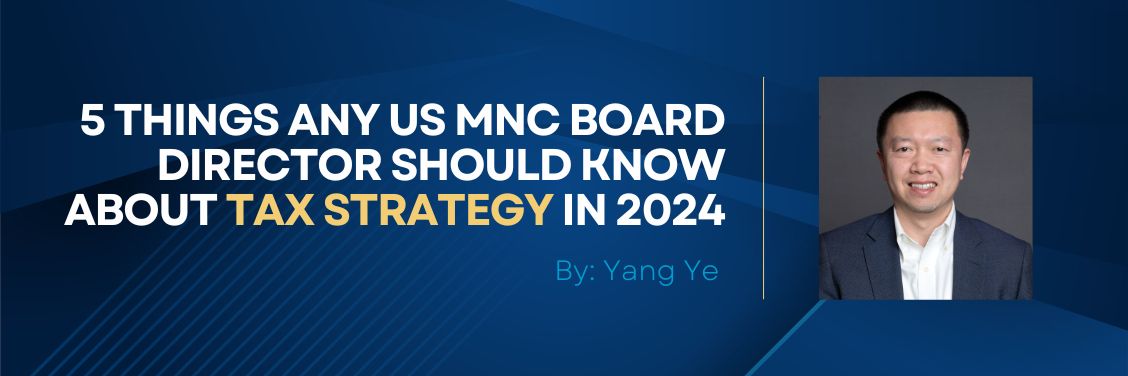Board Governance Insights Blog

Most people prefer to avoid contemplating the replacement in their role, especially just after they have been appointed to that position. This is exactly the reason that a company’s Board of Directors plays a pivotal role in the CEO succession planning process. It is also why that process should start soon after the appointment of a new CEO or other key executive. Ensuring that there are identified, qualified, prepared successors for the CEO and his or her key team members, and that there is a well-defined plan for those transitions, is an important part of the Board’s governance responsibilities.

DISCLAIMER: The information in this article is not meant to provide any legal, tax/accounting or investment advice. Please consult with your own investment, tax, and legal advisor.

Private companies face a variety of risks that threaten their ability to achieve their goals. These include geopolitical, cybersecurity, natural disasters, customer concentration, regulatory, competitive, and supply chain risks, in addition those specific to the industry and company. Unlike public companies that must adhere to SEC and other government agency risk disclosure requirements (such as describing risks in their 10-K financial statements), private companies are subject to no such rules. However, just as a robust Enterprise Risk Management (ERM) program benefits these public companies and their stakeholders, private firms and their owners can realize an enhanced chance of success by implementing a custom, properly sized ERM program. The Board of Directors places a key role in governance of the company’s risk and risk management efforts.

In today’s dynamic global business environment, strategic risk management has never been more critical. Boards of directors are increasingly recognizing their pivotal role in navigating uncertainties, managing risk and seizing opportunities. This article explores how enterprise risk management (ERM) empowers boards to take proactive steps toward comprehensive risk coverage and better governance.
Understanding Strategic Risks: Evolving Risk Management
Traditionally, risk management has centered on financial and operational concerns. However, the modern landscape demands a more comprehensive approach. Strategic risks—ranging from market fluctuations to emerging technologies—now require focused and forward-thinking responses. For instance, emerging technologies like artificial intelligence and automation can fundamentally reshape industry dynamics, potentially rendering existing business models obsolete or creating new cybersecurity vulnerabilities that could compromise critical operations. These technological shifts can rapidly transform competitive advantages into liabilities, making traditional risk assessment frameworks insufficient for modern challenges.
 Diversity, Equity, and Inclusion (DEI) in many circles has all become a dirty word over the past few years. Companies have responded in varies ways – ranging from doubling down on DEI commitments, dismantling DEI, putting their head in the sand and completely avoiding the topic all together.
Diversity, Equity, and Inclusion (DEI) in many circles has all become a dirty word over the past few years. Companies have responded in varies ways – ranging from doubling down on DEI commitments, dismantling DEI, putting their head in the sand and completely avoiding the topic all together.
Yet, study after study has proven that diverse teams improve performance, creativity, and stakeholder value. Diverse teams bring fresh perspectives, reduce group thinking, and better mirror the diverse markets and communities’ organizations serve, ultimately driving improved financial and operational outcomes.

When creditors take control of a debtor, they count on a newly appointed board to achieve their investment objectives, but, overwhelmingly, these boards fail to meet creditors’ expectations. In our over 20 years of work on behalf of creditors, we observe that the overwhelming majority of post-restructured boards do not add significant value, are misaligned with creditors’ objectives, or result in investors having to dedicate more time than desired. Creditors often comment that many such boards lack credibility, place heavy demands that demotivate management, and prove to be a distraction.

Succession planning for C-suite and board positions is not just a checkbox on an organizational to-do list; it’s a strategic imperative that can determine a company’s future success or failure. When done correctly, it ensures a smooth transition of leadership, maintains organizational stability, and preserves the company’s culture and strategic direction. When done poorly (or not at all) it becomes a reactive and chaotic exercise resulting in far-reaching consequences for the organization.

Part 2
In Part 1 we noted the distinction between a Strategy and a Plan and provided some backdrop for the development of a Strategy. We noted that there is a necessary exercise to know the company- why does it exist, what does it really do, what are the opportunities (and the risks) that surround the business, and no less important, what are the risks to the Strategy?
Here, we will now ask the existential question, “what will the company be when it grows up?” and lay out some of the actions that can help answer that question. Reminding ourselves that the Board has a duty to make certain the company has a Strategy, Management has the responsibility of developing the Strategy and ensuring the Board agrees with and will support the Strategy. Management, then, has the further responsibility of developing the Plan to implement the Strategy, and the Board has the oversight role to consider if the Plan is feasible, supportable, and acceptable within known constraints and will deliver on the Strategy- reaching the waypoints earlier described. Management has the enduring responsibility of making that test before the Board does, and to develop and implement any corrective actions needed to maintain the trajectory of the Plan.

Understanding governance and its relationship to family business legacy is critical for family and non-family board members and advisors.

"Renoirs in our Attics”- Implications for Intellectual Property in the Corporate World

Why Have a Strategy?
We all are familiar with the old adage of Boards being “noses in, fingers out” and can appreciate that the primarily responsibility of a Board is to NOT run the company. Far too many boards blur the line between management and oversight. Here, we present the concept that It is critical to differentiate between strategy and strategy implementation. Rather, the Board is responsible for ensuring an appropriate strategy and to ensure the executive team is running the company correctly and following the path outlined in the strategy. Moreover, there is the enduring obligation to represent and protect the interests of shareholders - we know this as a fiduciary responsibility.
We also know that the Board has a responsibility to ensure that governance is discharged effectively. One element of the governance spectrum of duties is to oversee the development and execution of a strategy for the enterprise. Depending upon the company, Board composition and industry, the development of Strategy can often be delegated to a Board committee or a hybrid model that includes corporate membership. There is not clear agreement about who makes the strategic choices that will shape the trajectory of the company. To clarify, the “noses in, fingers out” doctrine suggest that the Board is not responsible for the development of the implementation plan. They are, however, responsible to ensure one is developed, and then to evaluate the progress of the enterprise against that plan within the context of the strategy.

Recently, I found myself at the terrifying intersection of AI, cyber threats, phishing, the Internet, and CrowdStrike®—a collision that’s unnerving on a personal level but downright apocalyptic when you consider its implications for an entire company.

Artificial Intelligence (AI) is transforming the landscape of recruitment across various sectors, including the selection of members for both Advisory and Governance Boards in private companies. The promise of AI-driven hiring solutions lies in their potential to streamline processes, reduce costs, and enhance decision-making through advanced data analysis.

1. Why do you want to serve on a board?
Understanding your motivation for wanting to serve on a board is crucial. This introspection goes beyond simply stating a desire for career advancement or new experiences. It’s about identifying a deeper purpose that aligns with both your personal goals and the needs of the organization. For instance, you might be an expert in operational excellence, possessing a wealth of experience in streamlining processes and improving efficiency. In this case, your motivation might stem from a desire to apply these skills to help a company build a robust, long-term operational strategy.

A company’s tax expense in the US can be as high as 25-30% of its pre-tax US taxable income, and is one of the largest expense items on a company’s P&L. Thus, effective tax management plays an important part in optimizing profitability and cash flow. Board directors of a US-based multi-national company (“MNC”) should ideally be aware of the tax environment their company is operating under in 2024 and beyond. This article identifies five most important trends for any board director of a US MNC to consider.

The Private Directors Association (PDA) is proud to announce the appointment of Jean Vernor as the President of its Detroit-Toledo-Windsor Chapter. With her extensive leadership experience and commitment to business transformation, Vernor is poised to lead the Detroit-Toledo-Windsor Chapter to new heights, reflecting the city’s dynamic business landscape. Vernor succeeds Kimberly Rodriguez, who has served as Chapter President since 2020.

San Diego, California. Thirty years ago, a modest grocery business was founded by John Woods. Throughout the years, his tireless effort turned a small company into a strong organization led by John and his wife. For the past ten years, their offspring Tony, Maria, and Bill have been running the company from different management positions, employing more than two hundred people with twelve stores across the city. It was a natural step for the Woods children to come to work in their father's store after they graduated. Even in their late fifties, they look back at their choice to join the business with no regret.

“Networking is the No. 1 unwritten rule of success in business”

Meghan serves as President and Chief Data and Analytics Officer at Three Arc Advisory. She also serves on the Advisory Board of the Athena Alliance, a private for-profit organization in the US. In August 2023, she joined the Private Directors Association’s Chicago Chapter and sits on the National Cybersecurity Committee and the Chicago Chapter Programming Committee.

This is the first of three blog posts that will address certain key issues that the Board of Directors of an Employee Stock Ownership Plan (“ESOP”) owned company need to focus on: (1) Fiduciary Duties and Standard of Care; (2) Conflicts of Interest and Independent Directors; and (3) Unsolicited Offers. The focus of these blog posts is on the difference between issues in ESOP owned companies, compared to privately owned companies.
- Page 1 of 5
- << first < Prev 1 2 3 4 5 Next > last >>





 Diversity, Equity, and Inclusion (DEI)
Diversity, Equity, and Inclusion (DEI)













